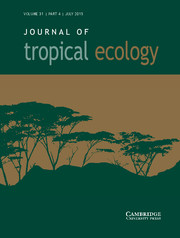Crossref Citations
This article has been cited by the following publications. This list is generated based on data provided by
Crossref.
Congdon, Robert A.
and
Herbohn, John L.
1993.
Ecosystem dynamics of disturbed and undisturbed sites in north Queensland wet tropical rain forest. I. Floristic composition, climate and soil chemistry.
Journal of Tropical Ecology,
Vol. 9,
Issue. 3,
p.
349.
Bowman, D.M.J.S.
1994.
Tropical rain forests.
Progress in Physical Geography: Earth and Environment,
Vol. 18,
Issue. 4,
p.
575.
1997.
Applications of Physiological Ecology to Forest Management.
p.
304.
Arunachalam, A
Arunachalam, Kusum (Maithani)
Pandey, H.N
and
Tripathi, R.S
1998.
Fine litterfall and nutrient dynamics during forest regrowth in the humid subtropics of north-eastern India.
Forest Ecology and Management,
Vol. 110,
Issue. 1-3,
p.
209.
Enright, N. J.
1999.
Litterfall dynamics in a mixed conifer‐angiosperm forest in northern New Zealand.
Journal of Biogeography,
Vol. 26,
Issue. 1,
p.
149.
Haase, Rainer
1999.
Litterfall and nutrient return in seasonally flooded and non-flooded forest of the Pantanal, Mato Grosso, Brazil.
Forest Ecology and Management,
Vol. 117,
Issue. 1-3,
p.
129.
Villela, Dora M.
and
Proctor, John
1999.
Litterfall Mass, Chemistry, and Nutrient Retranslocation in a Monodominant Forest on Maracá Island, Roraima, Brazil1.
Biotropica,
Vol. 31,
Issue. 2,
p.
198.
McDonald, M.A
and
Healey, J.R
2000.
Nutrient cycling in secondary forests in the Blue Mountains of Jamaica.
Forest Ecology and Management,
Vol. 139,
Issue. 1-3,
p.
257.
Enright, N. J.
2001.
Nutrient accessions in a mixed conifer–angiosperm forest in northern New Zealand.
Austral Ecology,
Vol. 26,
Issue. 6,
p.
618.
McIvor, John G.
2001.
Litterfall from trees in semiarid woodlands of north‐east Queensland.
Austral Ecology,
Vol. 26,
Issue. 2,
p.
150.
McIvor, John G.
2001.
Litterfall from trees in semiarid woodlands of north‐east Queensland.
Austral Ecology,
Vol. 26,
Issue. 2,
p.
150.
Lin, Kuo-Chuan
Hamburg, Steven P
Tang, Sheng-lin
Hsia, Yue-Joe
and
Lin, Teng-Chiu
2003.
Typhoon effects on litterfall in a subtropical forest.
Canadian Journal of Forest Research,
Vol. 33,
Issue. 11,
p.
2184.
Arato, Helga Dias
Martins, Sebastião Venâncio
and
Ferrari, Silvia Helena de Souza
2003.
Produção e decomposição de serapilheira em um sistema agroflorestal implantado para recuperação de área degradada em Viçosa-MG.
Revista Árvore,
Vol. 27,
Issue. 5,
p.
715.
Wood, Tana E.
Lawrence, Deborah
and
Clark, Deborah A.
2005.
Variation in leaf litter nutrients of a Costa Rican rain forest is related to precipitation.
Biogeochemistry,
Vol. 73,
Issue. 2,
p.
417.
Villela, Dora Maria
Nascimento, Marcelo T.
de Aragão, Luiz Eduardo O. C.
and
Da Gama, Deborah M.
2006.
Effect of selective logging on forest structure and nutrient cycling in a seasonally dry Brazilian Atlantic forest.
Journal of Biogeography,
Vol. 33,
Issue. 3,
p.
506.
Silva, Carlos José da
Sanches, Luciana
Bleich, Monica Elisa
Lobo, Francisco de Almeida
and
Nogueira, José de Souza
2007.
Produção de serrapilheira no Cerrado e Floresta de Transição Amazônia-Cerrado do Centro-Oeste Brasileiro.
Acta Amazonica,
Vol. 37,
Issue. 4,
p.
543.
Parsons, Scott A.
and
Congdon, Robert A.
2008.
Plant litter decomposition and nutrient cycling in north Queensland tropical rain-forest communities of differing successional status.
Journal of Tropical Ecology,
Vol. 24,
Issue. 3,
p.
317.
Wood, Tana E.
Lawrence, Deborah
Clark, Deborah A.
and
Chazdon, Robin L.
2009.
Rain forest nutrient cycling and productivity in response to large‐scale litter manipulation.
Ecology,
Vol. 90,
Issue. 1,
p.
109.
Parsons, Scott A.
Congdon, Robert A.
Shoo, Luke P.
Valdez‐Ramirez, Vanessa
and
Williams, Stephen E.
2014.
Spatial Variability in Litterfall, Litter Standing Crop and Litter Quality in a Tropical Rain Forest Region.
Biotropica,
Vol. 46,
Issue. 4,
p.
378.
Parsons, S. A.
Valdez-Ramirez, V.
Congdon, R. A.
and
Williams, S. E.
2014.
Contrasting patterns of litterfall seasonality and seasonal changes in litter decomposability in a tropical rainforest region.
Biogeosciences,
Vol. 11,
Issue. 18,
p.
5047.

